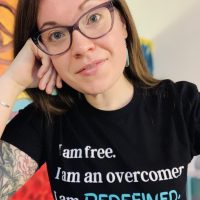I never had a Ken doll growing up.
I only had Barbies—a few of the “real” ones and a few generic ones. I used my imagination to pretend that Ken was there too.
Although invisible, his presence was very real to me. I played out one scenario over and over: Barbie was sick and Ken was at her bedside, loyal and steadfast. He took care of her. He never left. Never abandoned her. Always loved her.
I longed to be taken care of in this same way. I was constantly looking for the helper. The person who was really gonna be in my corner. The one who would step into the dark moments with me and take me by the hand so that I didn’t have to fight and flounder. I wanted my emotions to be heard and validated—my quirks to be loved, not just tolerated.
But once I grew up, I found myself looking for this care in all the wrong men. I gravitated toward guys who seemed masculine and in charge, but who weren’t actually equipped to care for my feelings in the way that I wanted. They were clueless at best and abusive at worst.
I never got my Ken doll. But somewhere along the way, the unexpected happened: I found myself.
And this is the key that I want to unpack for you today.
While I am 100 percent in favor of romantic relationships, I’ve learned that having a strong relationship with myself is the most important. Having a deep understanding of my own identity is the foundation that all other relationships build upon.
Rather than wondering why my Ken hasn’t shown up, the more important question is, what about Barbie? What about me? What about you?
If you’re not yet in a place where you feel connected to yourself, trust yourself, can validate your own feelings, or have your own back, then keep reading.
So many of us are quick to abandon ourselves in pursuit of another. We overemphasize their worth and devalue our own. And that’s only going to keep us stuck in an endless loop of unfulfilling (and even abusive) relationships. The answer to all of this starts with you.
Let’s break down the concept of identity. According to the dictionary, identity is “the fact of being who or what a person or thing is.” Hmm…sounds pretty straightforward, right? Actually, it’s anything but! It’s anything but straightforward, simple, or easy to define, because that definition doesn’t tell us the “how.” And it’s the “how” of identity that we are really seeking.
Most of us spend our teens and early 20s trying on different personas in pursuit of our true core identity. We study lots of subjects, try various clothing and hairstyles, search for the music and art that best defines us, hop around to different jobs, and date different types of people. It’s the natural developmental process of the “how.”
Then, we reach a certain age where it seems like we should have figured it out. That playful phase of self-exploration feels like it should be coming to an end, and pressure from outside sources tell us to grow up, settle down, and seek stability. But what if you’re still not sure who you are?
If you’ve been in relationships with abusive individuals, then it’s likely that you’ve actually allowed your identity to be defined by others. The “you” that everyone has come to know, may not really be you at all. That’s because when we experience abuse, the truth of who we are gets clouded. We look to others to validate us and affirm our worth. That’s harmful in and of itself, but the worst part is that abusers aren’t validating anything in us that does not ultimately serve them. They use a myriad of manipulative tactics to keep us guessing, confused, and lost in a fog of their own making. So, it’s natural that we’d feel ungrounded in our sense of identity.
After experiencing such abuse, I think the process of redefining what others have falsely defined, requires that we play. This is a return to the “how” of finding our identity. It must be an intentional process, driven by our own curiosity and openness.
As young children, play and art are our first languages. They’re our natural forms of expression, exploration, and communication. Your young-adult self may have understood this too, but trust in that process (and in yourself) has been broken. It’s important for us to return to a playful exploration of ourselves and our environment in order to begin uncovering the real identity, likes, interests, and values that lie within.
If it’s a struggle for you to get started, here are a few simple tips to help you inch in the right direction:
Play. What feels adventurous to you? Going on a weekend trip, trying a new restaurant, walking your dog at a different park, or taking a new route home? No matter how big or small, novel experiences ignite that playful, curious spirit of childhood. They can literally open up new pathways in your brain.
By trying something new, you’ll expand into new possibilities, get unstuck, and improve your mood. So, go ahead and splash in that puddle. Do what feels fun! There’s no wrong way to begin.
Create. When was the last time you created something all on your own? Was it a well-composed email, a delicious meal, or a beautiful outfit? Consider how you could take that one step further. If color excites you, then try scribbling with some crayons. No objective; just enjoy the process. If cooking feels fun, try a new and out-of-the-box recipe. And if writing words brings a sense of freedom, then commit to journaling every day this week. Whatever you do, simply choose to start.
Move. There is an increasing wealth of trauma research explaining that our traumatic experiences are stored in our physical bodies. There’s really no such thing as the mind-body connection, per se…because they are actually one and the same. Your anxiety, grief, and memories of the abuse are deeply affecting your body.
The good news? Engaging in intentional physical activities can help you begin to access and release this pent-up trauma. Start with something that feels good and accessible (emotionally, physically, spiritually). You may try stretching when you get out of bed in the morning, attending a yoga class, taking evening walks, dancing your heart out in the kitchen, or going for a run. Then, commit to a regular practice of moving your body.
Ultimately, redefining yourself after someone else has instilled or brainwashed a false sense of identity deep within you requires a total transformation. It requires work. And it is a process. It’s an ongoing pursuit that never really comes to an end.
You may find that statement daunting, but I find it exciting. It means that our potential for growth and transformation is limitless.


 Share on bsky
Share on bsky



Read 13 comments and reply